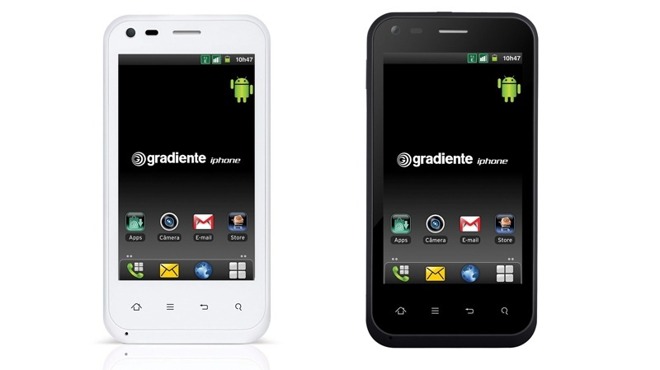Brazilian Supreme Court to decide whether Apple can use 'iPhone' brand name
The Brazilian Supreme Court is set to decide whether or not Apple can use the "iPhone" trademark in the country.

Credit: IGP Electronica
Apple has been entrenched in a long-running trademark dispute with Brazilian company IGB Electronica, which registered the "iphone" trademark in 2000 and produced several Android devices under the brand name in 2012. A lower court ruling in 2018 affirmed a 2013 decision that allowed both companies to use the name.
Earlier in 2020, IGB Electronica appealed the lower court's decision. Now, the highest court in Brazil will decide whether Apple can use the "iPhone" trademark, even if IGB registered for it first.
"Allowing a company to claim a trademark submitted in good faith by another one punishes creativity, distorts free competition and runs over Brazilian intellectual property authorities," said IGB attorney Igor Mauler Santiago in the request.
The back-and-forth dispute has been ongoing since IGB, under the name Gradiente Group, produced a number of IPHONE-branded Android smartphones in 2012. That sparked a dispute which saw both companies arguing for exclusive rights to the name.
Apple, for its part, argues that the National Institute of Industry Property (INPI) shouldn't have granted the trademark in dispute. Although it was filed for in 2000, the "iphone" name was granted in 2008 -- after Apple's first iPhone was released.
According to local law firm Mauler Advogados, Apple has taken "commercial deals" to acquire the iPhone brand name in countries such as Mexico, Canada and the U.S., regions where existing firms submitted trademarks to the name before it did.
It isn't clear when the Brazilian Supreme Court will hear the case or issue a decision.

Credit: IGP Electronica
Apple has been entrenched in a long-running trademark dispute with Brazilian company IGB Electronica, which registered the "iphone" trademark in 2000 and produced several Android devices under the brand name in 2012. A lower court ruling in 2018 affirmed a 2013 decision that allowed both companies to use the name.
Earlier in 2020, IGB Electronica appealed the lower court's decision. Now, the highest court in Brazil will decide whether Apple can use the "iPhone" trademark, even if IGB registered for it first.
"Allowing a company to claim a trademark submitted in good faith by another one punishes creativity, distorts free competition and runs over Brazilian intellectual property authorities," said IGB attorney Igor Mauler Santiago in the request.
The back-and-forth dispute has been ongoing since IGB, under the name Gradiente Group, produced a number of IPHONE-branded Android smartphones in 2012. That sparked a dispute which saw both companies arguing for exclusive rights to the name.
Apple, for its part, argues that the National Institute of Industry Property (INPI) shouldn't have granted the trademark in dispute. Although it was filed for in 2000, the "iphone" name was granted in 2008 -- after Apple's first iPhone was released.
According to local law firm Mauler Advogados, Apple has taken "commercial deals" to acquire the iPhone brand name in countries such as Mexico, Canada and the U.S., regions where existing firms submitted trademarks to the name before it did.
It isn't clear when the Brazilian Supreme Court will hear the case or issue a decision.

Comments
If this company applied in 2000, was approved in 2008, but did not actually use it in trade until 2012, if the Brazil law is at all similar to the US law, then this company may not be able to enforce it since they were not actually showing a "trade mark" -- a mark used in trade.
IANALAIDPOOTV
There was another company called iCloud which became CloudMe because Apple purchased the iCloud trademark from them.
The problem I see is companies using Apple's iconic "i" for attention. iHome, iGoogle and Sony's iSound are examples. None of these companies gave a sh** about the letter "i" until Apple started using it before their names. "The iComfort Sleep System" is the worse of the bunch.
Beats said:
Also, this company can claim that there was no opportunity to capitalize on their trademark - no operating system or platform that made their selling a device under that brand name - possible prior to Android. The other phone platforms were either proprietary, terrible or would have required them to do a lot of expensive and very technical heavy lifting to create a viable product. With Android all that was handed to them.
The horse left the corral... Years ago.
This is total BS. The other company filed a trademark, but if they were not using it in trade, they are in danger of losing the trademark (which probably should never have been issued if they were not already using it in trade at the time of application). There is no aspect of trademark law (at least in the US and I suspect it is similar in most countries) that allows you to register a trademark, and then say, oh no, there is no applicable product I can sell using this name -- it is all proprietary or too expensive -- and use that as a defense to keep your trademark. The trademark office does not really care WHAT your industry is, what you are doing with whatever product, as long as you are doing it in trade - in public.
There is no aspect of trademark law that protects a non-used trademark because a company claims they had no opportunity to capitalize on it.
The other company applied in 2000, and was granted in 2008, as I understand it, but if they did not start to use it in trade until 2012, and Apple was already in 2007 using the name in trade, the other company is probably (or should be) SOL since they did not actually use the mark and therefore have nothing to protect. Apple was actually there FIRST in trade.